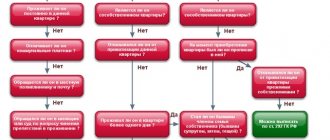Privatization of housing means a change of owner. The most common example: first, the apartment was transferred to the family under a social tenancy agreement, and after some time the tenant receives the right to privatize it and become the full owner.
But in practice, not everything happens so simply. Sometimes the municipality refuses to privatize, or some family members do not want to participate in privatization and thereby stop this process altogether. In such cases, you have to go to court and force privatization.
Next, we’ll talk about why privatization is needed at all, why sometimes it has to be carried out forcibly, and how this process works.
When is judicial privatization necessary?
Nowadays, the cost of an apartment, especially in big cities, is exorbitant.
And the only chance for many to own an apartment is privatization.
But to carry out such a procedure, the consent of all residents .
In addition to signing documents, tenants are required to appear in person to submit documents . Read about what package of documents is required for privatization here.
It is not always possible to comply with all the conditions; sometimes a person cannot or does not want to participate in the process. In this case, the only way out is to go to court .
But the reason is not always the disagreement of residents. Difficulties may also arise with government officials who deny the right to obtain rights to real estate. And it is not possible to solve the current situation by providing additional documents.
As for service apartments provided to the military, the only way to obtain ownership of housing is to contact a higher authority . It will not be possible to prove the right to living space in any other manner.
Thus, only in cases where it is not possible to resolve the issue of privatization in the usual manner through local authorities should you go to court.
How to dispute?
Only a court can declare the privatization of an apartment illegal. In order to challenge the legality of privatization, it is necessary to provide the courts with documentary grounds confirming the fact of violations committed during the privatization process.
The following may be considered sufficient grounds for consideration of a claim: documents confirming the facts of violations discussed above, or testimony of witnesses.
Having such evidence in hand, you need to take the following steps:
- Appear in court;
- Draw up a statement of claim;
- Provide a receipt for payment of the state duty (currently it is 200 rubles);
- Present the privatization agreement and evidence of the right to participate in it on the basis of documents confirming kinship or rights to residential meters.
If necessary, such documents can be obtained from state civil registration authorities (RAGS); - Attach evidence of violations discussed above.
How to file a claim?
You can draw up a statement of claim to challenge the privatization of an apartment with the help of a qualified lawyer, or you can file it yourself. A statement of claim to challenge the privatization of residential premises is drawn up according to the following template:
- In the header it is necessary to indicate the name of the body to which the claim is filed, from whom this initiative comes (passport details of the plaintiff) and to whom the claims are addressed (personal details of the defendant);
- The title should reflect the essence of the application;
- The body of the letter must include a description of the process and circumstances of privatization of a specific property; Important point! The application must contain a list of violations committed during the privatization process, with links to specific articles of laws;
- In the final part, the plaintiff sets out the essence of his request and lists all attached documents, certificates and certificates.
After the application is dated and signed by the plaintiff, he needs to submit the claim to the secretariat, receive the incoming application number and wait for notification of the date of consideration of the case, or of the refusal to accept the statement of claim for production.
How to challenge the privatization of an apartment after 12 years?
The laws of the Russian Federation establish a limitation period for operations related to the privatization of housing - 3 years. However, in practice this does not mean that after three years privatization cannot be challenged in court. However, for this you will have to go through quite complex and lengthy legal procedures.
So, for example, if one of the parties has complaints about the privatization process, say, after 12 years, then the following conditions will need to be met:
- Restore the statute of limitations, while providing justification and valid reasons for such a late application.
At the same time, whether to proceed further with the case or not rests entirely with the courts. - Provide a complete package of all necessary documents and certificates confirming violations of the law in the process of privatization of a specific property.
There is no guarantee that after the expiration of the required 3-year statute of limitations, the court will accept the appeal under the privatization procedure. Unless, of course, there were serious violations of the legislation of the Russian Federation when registering the property.
Thus, it is necessary to approach the issue of exercising your right to privatize housing in the most careful manner, because such a right is given to every citizen only once in his life.
In addition, it is necessary to carefully study this issue from all sides so as not to fall into one of the situations described above. Otherwise, you can lose your property and lose the right to privatization forever!
Grounds for forced privatization
There are a number of grounds for resolving the issue of transferring an apartment into personal ownership through a legal authority - the court. Let's list them:
- The residential building in which the apartment is located is not included in the Unified State Register of Companies .
- When challenging the legal status of a living space , for example, if it is necessary to determine whether the apartment is a service apartment or not.
- If not all responsible tenants agree to the procedure for obtaining housing in personal possession (in this case, their written renunciation of their share , certified by a notary, is required).
- State or municipal authorities refuse applicants to carry out the privatization procedure (the basis for the application will be a written refusal from representatives of these bodies).
- One of the responsible tenants has gone missing (the person must have been missing for more than five years and be officially declared dead, otherwise the procedure will not be possible).
A sample form can be downloaded here.
Features and nuances
The right to participate in privatization of the following persons will have to be proven in court if a person lives in an apartment but is registered at a different address (for example, a common-law spouse).
The privatization procedure is available to every citizen of the Russian Federation once (except for minor children) and only voluntarily. Each tenant has the right to independently decide whether to participate in privatization or not. Forced privatization is impossible even through the courts .
In addition to the basic documents, you may also need a power of attorney to privatize an apartment. You can read about it here.
What kind of housing cannot be privatized?
Not in all cases it is possible to apply for an apartment as personal property. There is a list of residential premises that the state cannot transfer into private ownership (Law “On the Privatization of the Housing Stock of the Russian Federation”, Article 4). These include:
- Living rooms in a dormitory . These premises belong to the state and the rights to them cannot be challenged.
- Service apartments . A person can live in such premises only with the consent of the state and as long as it allows it. Essentially, it is a tenant-tenant relationship. To be able to rent such an apartment, it must be officially recognized as non-business.
- Housing in houses recognized as unsafe . In the event of the destruction of a building, all apartment owners receive insurance payments, which is disadvantageous to the state.
- Apartments in closed cities . For example, seasonal buildings that operate only at certain times of the year. The ban is due to the fact that in such buildings utilities are connected only during seasonal work.
- The living space is under arrest.
Is it possible to force a tenant to privatize an apartment through the court?
also impossible to obtain ownership of a residential premises if one of the residents refuses to sign the application . However, he does not agree to formally renounce his part of the apartment and is not declared dead. Authorities cannot force a person against his will to undergo the procedure of obtaining rights to real estate.
In addition, if a citizen once participated in free privatization, he does not have the right to claim state property again.
When there is trouble in the family
It so happens that relatives or previously close people who do not communicate for a long time and do not even intend to establish relationships with each other remain connected by a common living space. At the same time, each of those living in it has the right to privatize a share of this area, but not everyone wants to use it. As a rule, this happens due to malicious intent, when certain entities, creating unbearable conditions for living together for the remaining residents, use the entire living space or demand some additional conditions for themselves, for example, payment of all utilities for their stay.
Such a case is possible when there are several owners of municipal or state residential premises and some of them refuse to exercise their right to privatize this housing. A rather difficult situation arises.
And although there is an opinion that in such cases forced privatization through the court is necessary, it is quite difficult to resolve the issue in court.
Documentation
To privatize an apartment, the court will need to collect a package of documents, which includes:
- Copies of passports of all residents registered in the apartment.
- If there are minors registered in this living space, then it is necessary to provide their birth certificates.
- Extract from the house register. If you are unavailable, you can order an extract through State Services, see the guide at the link.
- Evidence of the legality of the redevelopment, if any.
- Social tenancy agreement
- A document confirming your right to an apartment (passport or warrant).
- A certificate stating that persons participating in privatization are undergoing it for the first time.
- If not all registered citizens participate in the process, it is necessary to submit their notarized renunciation of property or death documents.
Is it needed at all?
If we take the general situation, when there is peace and quiet in the family, no one is going to move anywhere, change an apartment or sell it, then is privatization necessary? If the answer to the question were obvious and that it was necessary, then by the beginning of the 21st century the overwhelming majority of apartments in our country would have been privatized.
And in this case, the government did not need to postpone the introduction of payment for the transfer of ownership of real estate from the state to a private person until the next March 1st. But a lot of apartments are not privatized. This means that the answer to the question is not so obvious.
All the arguments that owning your own apartment makes you feel confident, makes you less tied to housing, and gives you ample opportunities to start a business, because now you have collateral, do not sound convincing to everyone.
Let's make you and I a little skeptical. What's stopping you from being confident? It is unlikely that a couple of tens of square meters of living space still do not belong to you as private property. Mobility? The door is locked and I go wherever I want, and I pay for utilities through my neighbor Aunt Masha, regularly sending her money.
Open your own business by taking out a large loan? Counter question - have you looked at the statistics? 9 out of 10 entrepreneurs fail in the first year of their activity, the rest - in the next five years. You know, this business is dubious.
That is, under normal conditions there is no urgent need to privatize your apartment. We will have to do this, which means we will pay the state as much as it deems necessary.
Well, aren't there animals sitting there?
But this is all good for those who have not encountered the immoral behavior of any of the residents of this apartment.
If you live with your parents, and you have a young child, and one of the parents regularly abuses alcohol, causes scandals, and all this in front of their grandson or granddaughter, then you will involuntarily want to somehow solve your housing problem.
Another situation. There are no parents, adult children remain in the apartment. One of them goes to work in another city and lives in a rented apartment. The other stays in the apartment and starts a family. The first understands that it would be a good idea to solve his housing problems by privatizing his and his brother’s (or sister’s) apartment, and subsequently changing or selling it.
His relative has a different opinion. He clearly understands that he lives in such an apartment only because it is not privatized. Otherwise, he will have to be content with much more modest square meters of living space.
And in these cases, on the one hand, there is an urgent desire and need to privatize the apartment, and on the other hand, there is an obstacle in the form of his relative, who categorically does not want to do anything to start the privatization process.
Come on, if the only question was that he didn’t want to do anything. But he is against privatization itself and is determined. What to do in such situations. We need to try to privatize the apartment through the court.
How to file a claim?
A claim for privatization of an apartment (sample) for going to court is drawn up in accordance with the Civil Procedure Code (Chapter 12, Article 131 “Form and content of the statement of claim”) and includes the following points:
- The name of the department to which the application will be submitted.
- Place of residence of the plaintiff.
- It is necessary to indicate the defendant; in this case, it can only be a government organization that denied the right to receive housing.
- Indicate what rights of the plaintiff were violated, state your demand.
- Provide evidence that the defendant is wrong.
- List of all documents attached to the application.
- Plaintiff's signature.
Here you can download a sample application to the court for the privatization of an apartment.
Standard samples of claims for the privatization of an apartment must be filled out without errors, otherwise the claim may be rejected.
stumbling block
After all, the very first thing you must do when starting the process of registering ownership of an apartment is to obtain the consent of all its residents. They must sign the privatization application and appear in person at the privatization center when all documents have been collected.
The absence of at least one of them will make privatization impossible.
And then what to do if one of the family members refuses to privatize the apartment. The reasons for such a decision may be different. This is an opportunity to once again show your importance, and perhaps a reluctance to lose your influence on family members. After all, in this way you can persuade the other residents of the apartment to fulfill some of their conditions.
And it is not at all necessary that a person lead an immoral lifestyle. If a resident of an apartment understands that by agreeing to its privatization, he will in the near future be involved in the division of an already privatized apartment and its sale, but he does not want this, then it is easier to proactively prevent this situation.
Yes, there will be quarrels and there will be scandals. But the price of these quarrels and scandals is living in this apartment, which is dear to such a person both as a memory and as a place of residence. For example, a good area, pleasant neighbors, a three-room apartment, a clinic opposite. What will he get in return? Some dubious living space, it’s unclear where and surrounded by people he doesn’t know. Put yourself in this situation.
Even the fact that this tenant will never again have to play chess on a bench with his neighbor Petrovich is already an annoying nuisance.
No matter how obvious it is to his family that it would be better to privatize this apartment, he, like a chess player, sees the situation several steps ahead. And he really doesn’t like what he sees. Therefore this is the decision.
Forced privatization of an apartment through the court
After filling out the statement of claim, the plaintiff must carry out the housing transfer procedure, which consists of several stages:
- File a claim for the privatization of an apartment.
The authorities will review it within two months, after which a verdict will be rendered.After the verdict is announced, the plaintiff has another month to go through all the necessary procedures provided for the transfer of state property to private individuals.
- Payment of state duties and other expenses. All receipts must be presented.
- Drawing up and signing a contract for the transfer of rights to property. Only a positive court decision on the privatization of an apartment is the basis for this procedure.
- Obtain documents on the ownership of the living space from the state register . You must first submit to this authority all documents confirming your right to own housing.
Cost and processing time
When filing a claim, you must provide a receipt confirming payment of the state fee in the amount of 300 rubles.
Valery Isaev graduated from the Moscow State Law Institute. Over the years of work in the legal profession, he has conducted many successful civil and criminal cases in courts of various jurisdictions. Extensive experience in legal assistance to citizens in various fields.
Privatization is a unique procedure that allows citizens of the Russian Federation to acquire ownership of housing, absolutely free of charge. But, unfortunately, in the process of re-registration, employers may encounter a number of problems that can only be resolved in court.
How to do this correctly, let's figure it out.
Refusal to privatize an apartment by court decision
However, there are cases when authorities have the right to deny the plaintiff the right to obtain housing rights:
- Utilities have not been paid. To appeal the refusal, read how to privatize an apartment with housing and communal services debts.
- The layout of the living space was carried out illegally.
- The documents submitted by the plaintiff turned out to be invalid.
- The applicant has already participated in obtaining other housing free of charge.
What are the reasons for going to court?
Everyone knows that privatization is voluntary. The time comes when the residents of a municipal apartment decide to transfer it into their own property. To do this, they go to the administration, where they write a statement. It would seem that half the battle is done, but not everything is so simple. As practice shows, there are cases when not all residents express a desire to privatize an apartment, and without their consent there can be no talk of any privatization. There are quite a few reasons for refusal, for example, personal grievances or financial difficulties.
In what cases should you seek help from the court:
— one or more residents express their disagreement;
- the house in which they want to privatize the apartment is not listed in Rosreestr;
- the administration or other government body refused privatization;
- one of the tenants renounced the share in favor of one or more tenants;
- the tenant has disappeared and is listed as missing;
— the applicant wants to resettle people.
There may be many reasons, but the essence will still remain the same - the standard version of privatization is impossible. In case of going to court, the plaintiff will have to provide evidence of this (a written complaint to the administration, testimony of witnesses, relatives, etc.). If you have any questions, you can seek help from a housing lawyer in Yekaterinburg
.
Deprivatization of the apartment
Deprivatization is the recognition through court (forcibly) of the invalidity of an agreement on the transfer of ownership of living space . Typically, the basis for such a decision is violations when concluding an agreement to transfer property into private hands.
In order to deprivatize an apartment you must:
- Submit an application to the court , attaching to it a package of documents similar to what is submitted when applying for the transfer of rights to an apartment. Except that consent to deprivatization is not required from all persons registered in the apartment. Moreover, the voluntary return of housing to the state is called deprivatization and is carried out in a different manner.
- The request will be considered in two months . If the decision is positive, the housing will again become state property.
A sample statement of claim can be downloaded here.
The following have the right to submit an application for deprivatization:
- Persons involved in the procedure for obtaining housing.
- Official guardians.
- Child protection.
- State and municipal authorities.
- Guarantors.
- Prosecutor's office employees.
Due to the fact that privatization can be challenged at any time, there is a risk associated with the purchase of such an apartment. After the deprivatization procedure, new residents will be required to vacate the property without returning money or paying any other compensation.
Getting housing for military personnel
As a rule, housing for military personnel is allocated from the Ministry of Defense fund. It is this circumstance that determines the special procedure for privatizing real estate for this category of employees. The first step on the path to your own housing is to determine the specific body on whose balance sheet the apartment is listed. The ability to participate in the procedure often depends on the length of service available. Military personnel, like other citizens, have the right to seek judicial protection in the event of a violation of their interests. To do this, you need to file a claim and collect the necessary papers.
Case Study
There were 4 people registered in the apartment. The father is a responsible tenant on the basis of a social tenancy agreement, his wife and two children. It was decided to formalize consent for one of the daughters; all relatives signed written statements and certified them in a notary office. After this, they turned to the local administration to conclude a privatization agreement. Their application was rejected, based on the fact that the house was registered as a service house and was not included in the real estate register. After receiving requests from the relevant authorities, documents were collected and a statement of claim was filed in court. The court refused to satisfy the demands due to the fact that the office premises are not subject to privatization.









